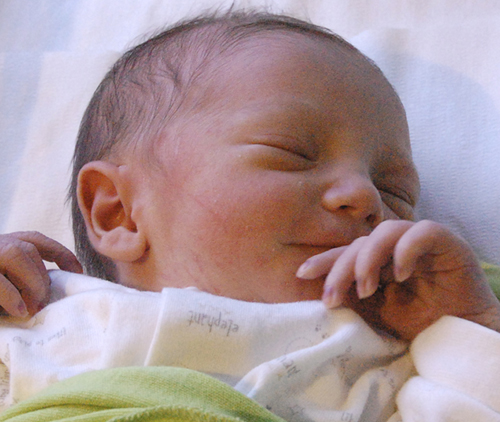Finally, your baby is in your arms! As you recuperate in the hospital, you’ll get to know the baby you’ve waited to meet.
Your baby today
In the first 24 hours, your baby should pass urine and meconium,
the first black, sticky feces, that are made up of waste products and
bile. You’ll be changing plenty of diapers, and in no time, you’ll be a
diapering pro.

At last, you’re a mom!
You may feel love at first sight, when you first hold your baby after
the birth, but for many women bonding takes place over the next few days
or weeks. For both parents, skin-to-skin contact with your baby helps
the bonding process and is particularly beneficial for premature babies.
Try not to be anxious when you pick up your baby. In the first few
weeks, your baby has little head control, so support him with a hand
under his head and shoulders, or both hands under his arms and with your
fingers supporting his head.
The nurses
in the maternity ward are there for help and support. You’ll be asked
if you’ve urinated and will be given help with breast-feeding if needed.
A lactation consultant will likely also be on hand to guide you through
the initial difficulties you may encounter when nursing is unfamiliar.
If your hospital offers “rooming in,” you’ll get to spend most of the
day with your baby present, except when he is taken by the nurses for
routine testing or examinations by the staff pediatricians. You’ll also
be visited by your doctor every day that you’re in the hospital so he or
she can check on your progress.
Safe sleeping
Crib death is a concern
for all new parents. Follow the guidelines from the National Institutes
of Health’s “Back to Sleep” campaign to minimize the risks.
Put your baby on his back to sleep.
Don’t let your baby get too hot.
He really doesn’t need a blanket. If it’s chilly, add layers and make
sure his feet are covered, but don’t go overboard. In the summer, he may
be most comfortable sleeping in just a onesie—but make sure the fan or
air conditioning vent isn’t directly overhead.
Don’t let anyone smoke around your baby
Never sleep with your baby on a sofa or armchair.
The safest place for your baby to sleep
is in a crib or co-sleeper near where you sleep. If you bring the baby
into your bed to breast-feed, put him back in his crib or co-sleeper
when done.
Keep all soft objects, like pillows, toys, and loose bedding out of the baby’s crib. A firm mattress covered by a fitted sheet is best.
Your baby’s reflexes
Newborn babies have reflexes.
that form part of their survival skills. In addition to the rooting and
grasping reflexes shown here, babies also have a startle reflex,
whereby they will fling out their arms if unsupported, and a stepping
reflex, which means they will step their feet up and down if held
upright on a surface.
Rooting reflex: If you touch or stroke your baby’s cheek, he will turn toward that side with his mouth open in search for food.

Grasping reflex: If you place your finger in the palm of your baby’s hand, he will instinctively tightly grip your finger.
